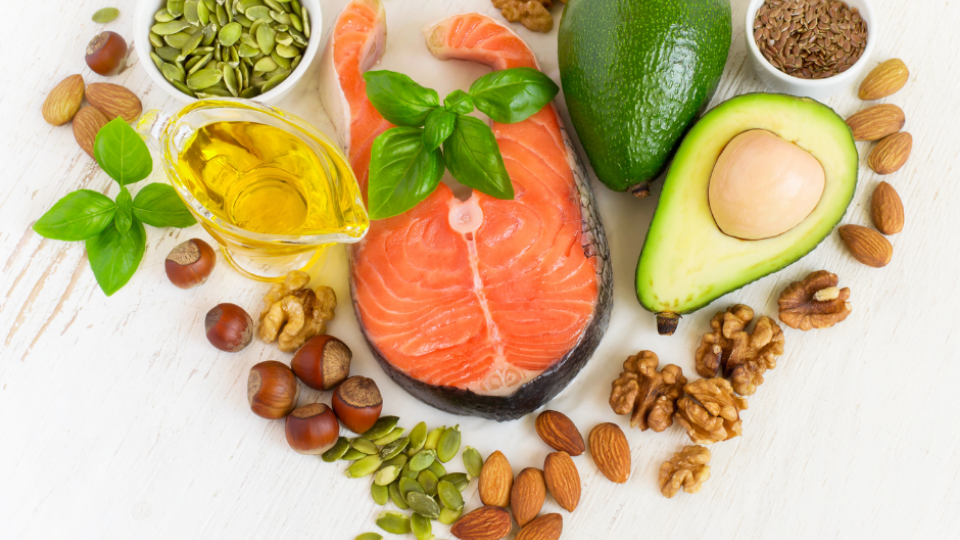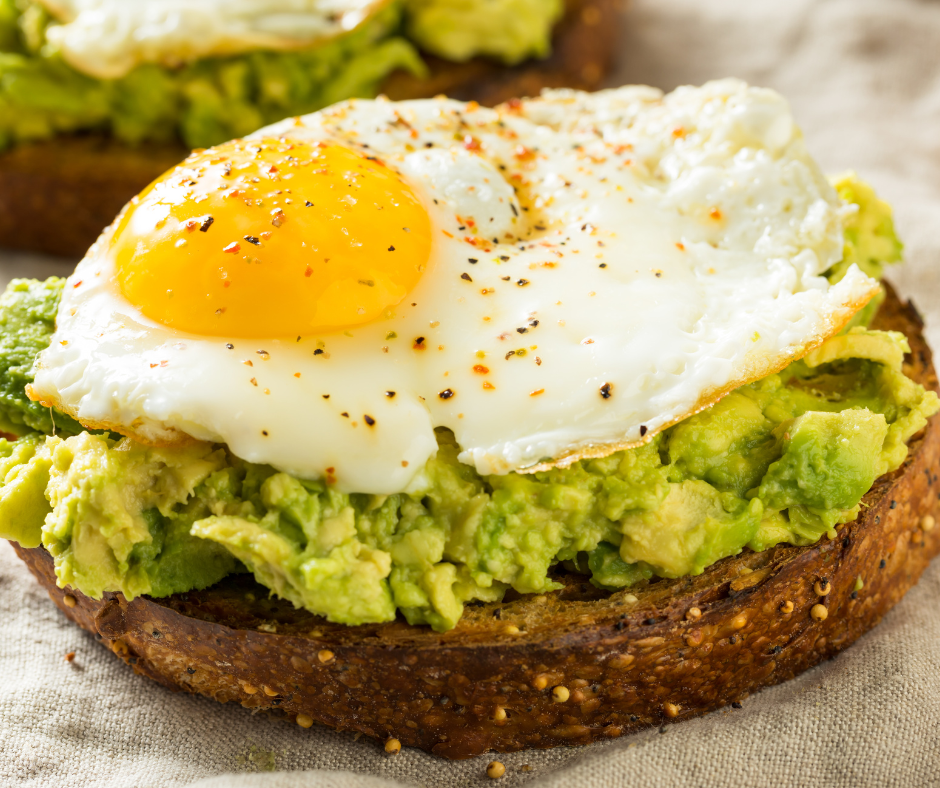

Dietary Fat is essential to a runner’s overall health and acts as a supporting fuel, alongside carbohydrates, during endurance exercise. However, to experience these benefits, a runner must be intentional when choosing the type, amount, and timing of dietary fat intake. This article will explore dietary fat and its effects on endurance performance, recommendations for consumption, and ideas for incorporating fats into your diet.
Dietary fat is a macronutrient composed of individual fatty acids. Within the body, fat provides energy for cellular function, protects organs, promotes brain health, and regulates cholesterol and blood pressure levels. Adequate intake of dietary fat is also important because it helps the body absorb fat-soluble vitamins including vitamins A, D, E, and K. There are two major types of dietary fat: saturated and unsaturated. Saturated fat, if eaten in excess, is associated with raising LDL (bad) cholesterol levels and increasing risk of heart-related health issues. This type of fat is common in animal products including beef, pork, lamb, full-fat dairy, butter, and lard. Two plant-based foods that are exceptions and are high in saturated fat are coconut oil and palm oil. Because a high intake of this type of fat is associated with negative effects on heart health, it is recommended that we limit saturated fat intake to less than 10% of our total calories each day. Unsaturated fat, often called “heart-healthy fat,” can improve cholesterol levels, decrease inflammation, and support brain function. There are two main types of unsaturated fat which are monounsaturated and polyunsaturated. Recognized for abilities to lower LDL cholesterol levels and maintain cell function, monounsaturated fats are found in cooking oils, nuts, nut butters, avocados, and olives. Similarly, polyunsaturated fats can lower cholesterol levels while also playing roles in creating cell membranes and assisting with blood clotting. Omega-3 fatty acids, a specific type of polyunsaturated fat, can lower triglyceride levels and blood pressure while raising HDL (good) cholesterol levels, promoting improved heart health. Foods that are rich in polyunsaturated fats include soybean oil, corn oil, walnuts, flaxseeds, sunflower seeds, and fatty fish. Because of the numerous health benefits that come from consuming unsaturated fats, individuals are encouraged to prioritize this type of dietary fat on a regular basis.

The primary function of fat during endurance exercise is to provide energy – especially towards the end of a prolonged run. While carbohydrates often serve as the primary source of energy during exercise, the body draws more energy from fat as the duration of exercise increases and the intensity decreases. Thus, eating adequate amounts of dietary fat on a regular basis can assist runners in executing peak performance through the end of endurance exercise. It is also important to note that training plays a role in an individual’s ability to convert fat into energy. Research has shown that as training frequency increases, an individual is able to use more fuel from fat during future exercise sessions. Ultimately, this adaptation can provide additional fuel during exercise, enhancing a runner’s endurance performance in competition. Lastly, adequate dietary fat intake can reduce the risk of injuries and promote optimal recovery by reducing inflammation after exercise. To accomplish this, runners should prioritize consumption of unsaturated fats – especially omega-3s – from high-quality sources such as walnuts, fatty fish, olive oil, avocado oil, flaxseeds, and chia seeds. By eating enough unsaturated fat, runners can ease soreness/pain, expedite muscle repair, and regain equilibrium as quickly as possible.
The Acceptable Macronutrient Distribution Ranges (AMDRs) are evidence-based guidelines for Americans regarding the intake of carbohydrates, protein, and fat. These ranges are recommended because they provide individuals with adequate amounts of essential nutrients and are associated with optimal health outcomes. In accordance with the AMDR for fat intake for healthy adults, it is recommended that endurance runners get 20-35% of their total energy intake from fat. This translates to an intake of roughly 0.5 to 1.5 grams (g) of fat per kilogram (kg) of body weight each day. Consuming less than 20% of calories from fat can compromise a runner’s endurance performance and even result in negative health complications. In general, endurance runners are free to determine how to meet their daily fat needs. However, it is recommended that runners limit their fat intake during their pre-exercise meals (especially those that are eaten within an hour or two of exercise) to prevent gut distress during endurance exercise. It is also important to recognize that the types of dietary fat consumed on a regular basis can affect endurance performance. Eating foods high in saturated fats can make individuals feel sick and sluggish, emphasis should be placed on eating unsaturated fats most of the time. This will not only promote better long-term health outcomes among runners, but it will also assist in enhancing endurance performance. Table 1 provides examples of how these recommendations can be met. Table 1. Examples of calculating daily dietary fat recommendations for runners
| Example Calculation | Meal Plan to Meet Dietary Fat Needs |
|---|---|
| To calculate the dietary fat needs for a 130-pound (lb) runner, we have to first convert lbs to kgs. To do this, we take 130 and divide by 2.2 because there are 2.2 lbs in 1 kg. 130/2.2 = 59.1 kgs Then, we take 59.1 kgs and multiply it by the dietary fat recommendation which is 0.5 to 1.5 g of fat per kg of body weight. 59.1 kgs x 0.5-1.5 g fat/kg body weight = 29.6 to 88.7 g of fat each day This runner needs to eat between 30 to 90 g of fat each day to meet their needs. | Breakfast: Two scrambled eggs, whole wheat toast with 1 tablespoon of peanut butter, fruit, and 1 cup (8 oz) of 1% milk. (20 g fat) Lunch: Grilled salmon (3.5 oz), whole grain rice, and steamed broccoli (13 g fat) Pre-exercise snack: Non-fat yogurt, granola, and a banana (3 g fat) Dinner (Post-exercise): Chicken fajitas (chicken, peppers, and onions cooked in ½ tablespoon of olive oil) topped with 2 tablespoons of shredded cheese. Served with a side of ¼ cup guacamole. (24 g fat) Total g fat: 60 g of fat |
| To calculate the dietary fat needs for a 180 lb runner, we have to first convert lbs to kgs. To do this, we take 180 and divide by 2.2 because there are 2.2 lbs in 1 kg. 180/2.2 = 81.8 kgs Then, we take 81.8 kgs and multiply it by the dietary fat recommendation which is 0.5 to 1.5 g of fat per kg of body weight. 81.8 kgs x 0.5-1.5 g fat/kg of body weight = 40.9 to 122.7 g of fat each day This runner needs to eat between 40 to 130 g of fat each day to meet their needs. | Breakfast: Two pieces of whole grain toast topped with ½ avocado and 2 eggs. Served with fruit and one cup (8 oz) of 2% milk. (27 g fat) Lunch: Chicken Caesar salad (2 cups romaine, ½ chicken breast, 2 tablespoons of Caesar salad dressing, 2 tablespoons parmesan cheese). Served with a whole wheat roll. (26 g fat) Pre-exercise snack: Strawberry banana smoothie made with non-fat yogurt and half of a cinnamon raisin bagel. (3 g fat) Dinner (Post-exercise): One 4-oz turkey burger served on a whole wheat bun topped with lettuce, tomato, and 1 tablespoon of olive-oil mayo. Served with a side of potato wedges and roasted vegetables (cooked in 1 tablespoon of olive oil). (29 g fat) Total g fat: 85 g fat |

If you struggle to incorporate heart-healthy fats into your diet on a regular basis or are simply looking for some new meal and snack inspiration, here are some easy and tasty ideas:
Madison Gunter, RD, Master of Public Health Student
Jenna Dyckman, Extension Assistant Professor